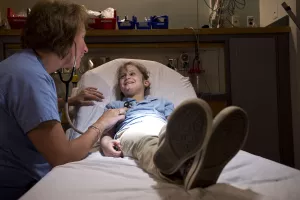Our story of caring for children begins as a floating hospital on a ship in Boston Harbor in 1894. Fast forward to today, and that spirit of delivering care under any circumstance is alive and well. That means piloting a program to fight food insecurity for pregnant parents and or conducting ground-breaking clinical trials in genetic testing. It’s also creating a first-of-its-kind collaboration with Boston Children’s Hospital (BCH) to bring care to children in need across Massachusetts. This collaboration brings the best minds in pediatrics together. Residents from BCH train at Tufts Medicine hospitals and community locations, and Tufts University School of Medicine students are exposed to advancements in pediatric medicine at Tufts Medicine and BCH locations.
From behavioral health issues to cardiac concerns, Tufts Medicine Pediatrics + BCH are partnering to provide our pediatric community with expert care and a welcoming environment.




